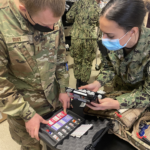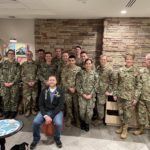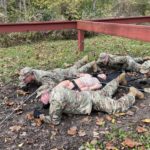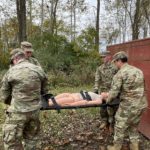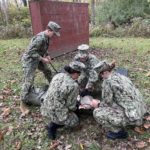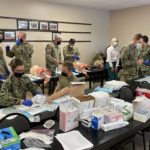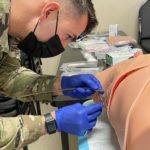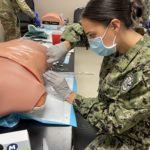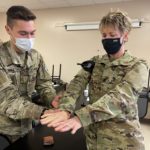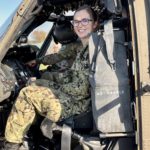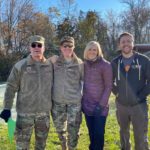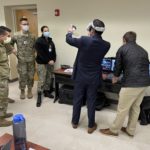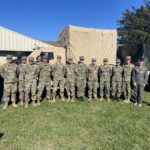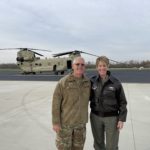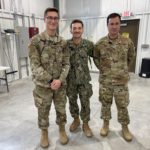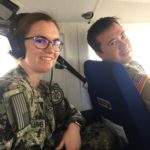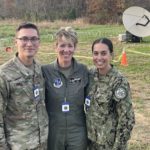Eleven student doctors with military ties, alongside a small group of faculty and staff, had an opportunity to participate in a cooperative exercise involving military and civilian members, as well as partner nations. Known as Bold Quest (BQ), the purpose of this annual event is to improve interoperability across systems, services and nations. This year, BQ was held at Camp Atterbury Army Base in Indiana.
BQ takes tactics, techniques, procedures and technologies of coalition partners and U.S. forces, puts them to the test, and forces them to work through real-world challenges. Along with improving the capabilities of already existing systems, BQ is also an opportunity for U.S. military branches and partner nations to showcase and refine hardware and software that is in earlier stages of development.
The two-week training, held in November this year, offered ICOM students a significant opportunity to exercise and train in combat medical care. The first week kicked off with a combat litter obstacle course, followed by a series of lectures on combat trauma. Utilizing desktop trainers, student doctors learned how to perform cricothyrotomy, needle chest decompression, chest tube and tourniquet placement, mass casualty triage, and FAST ultrasound exams along with measuring Optic Nerve Sheath Diameters to estimate intracerebral pressures in theater. Each day culminated in the application of these skills at the Medical Simulation Training Center (MSTC) at Camp Atterbury, utilizing their combat manikins and simulated war environment.
Student Doctors also participated in a Lunchtime Leadership Series, where esteemed speakers including Brig General Army Aviator, retired SEAL sniper, Brig General Air Force Combat Controller and the 16th Chief Master Sergeant of the Air Force, spoke with the students about leadership, officership, the stress of combat and what a great military medical physician can do to support the mission.
During the second week of training, students partnered with the Air Force Research Lab to perform in-field testing of wireless medical documentation and software, and were able to test these devices and their data transmission in flight. Students also tested virtual-reality combat training software and watched the Special Forces practice the infiltration of a building and rescue of a simulated hostage at night, as well as witness dozens of airborne troops parachute into a field.
Ten of the ICOM medical students attending are involved in the Health Professions Scholarship Program (HPSP). The program offers two-, three-, and four-year military scholarships, which covers civilian medical school tuition and most other education-related expenses. Participating students are commissioned as officers and will complete active duty service after residency.
The student doctors representing ICOM at Bold Quest include: Lijah Vann Gardner, OMS-IV; Eric Hall, OMS-IV; Erica Latorre, OMS-IV; Jared Machado, OMS-IV; Matthew McLaughlin, OMS-IV; Abhishek Mishra, OMS-IV; Albert Nakayama, OMS-IV; Bryce Perry, OMS-IV; Taylor Plumb, OMS-IV; Jarom Ruby, OMS-IV; and Channing Stroud, OMS-IV.
ICOM faculty and staff also provided training to interested military medics attending with their respective units, including: Dr. Lora Bennett, Assistant Professor of Family Medicine; Dr. Marlin Trainer, Assistant Professor of Emergency Medicine; Casi Wilson, Director of Clinical Simulation; and Todd Hillman, Simulation Operations Specialist.
